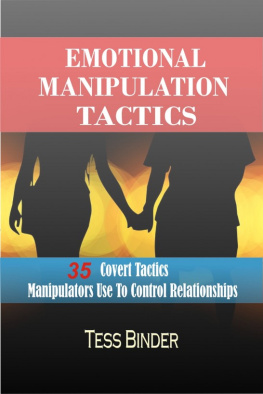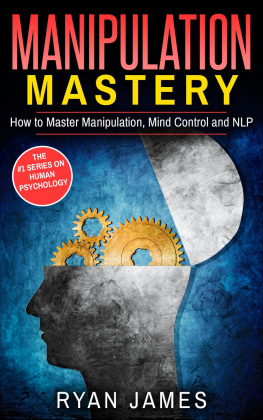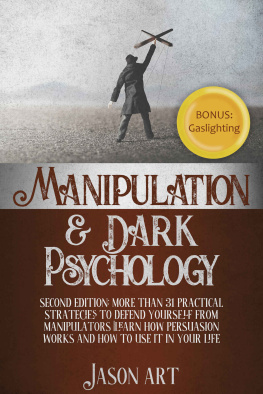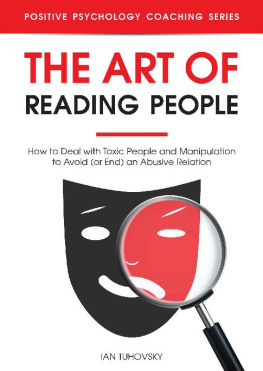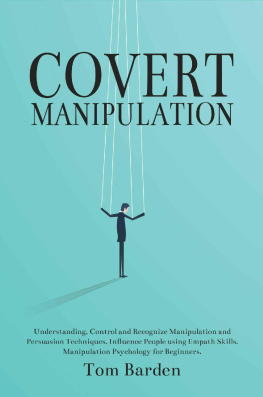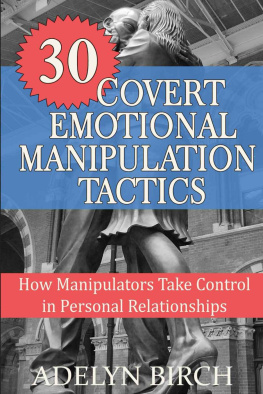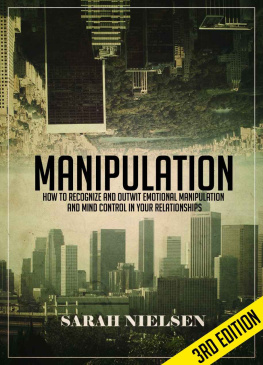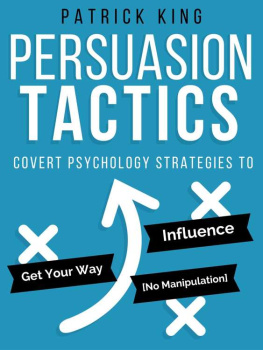Emotional Manipulation Tactics
35 Covert Tactics Manipulators Use To ControlRelationships
Tess Binder
Copyright 2015 by Tess Binder
All rights reserved. No part of thispublication may be reproduced, distributed, or transmitted in anyform or by any means, including photocopying, recording, or otherelectronic or mechanical methods, without the prior writtenpermission of the publisher, except in the case of brief quotationsembodied in critical reviews and certain other noncommercial usespermitted by copyright law.
Published by Winsome X Publishing atSmashwords 2015
Table Of Content
CHAPTER ONE
Understanding Covert EmotionalManipulation
The lion does not need the whole world tofear him, only those nearest where he roams.
A.J. Darkholme, Rise of the Morningstar
Covert emotional manipulation is a deceptiveand abusive form of exercising control in relationships. It occurswhen a person uses underhanded methods to change the other personsthinking, behavior and perceptions for the purpose of gaining powerand control.
A manipulative relationship is unbalanced andone-sided because it advances the manipulators goals at theexpense of the one being manipulated. It lures the victims in andholds them psychologically captive. We do not easily recognize itfor what it is because it goes against our basic assumptions abouthuman behavior.
As a matter of fact, manipulation is a signof an unhealthy personality functioning. Manipulative people do notconsciously plan their maneuvers. Rather, they come from apersonality disorder within them that are played out within thecontext of the other person who entertains the manipulator andunknowingly fuels the manipulation.
Covert emotional manipulation is sneaky anddangerous. It systematically wears away at a persons sense ofself-worth, self-confidence, self-concept and personal value. Itrobs a person of independent judgment, soundness of mind and trustin their own perceptions. Emotional abuse is really worse than itsphysical form for it cuts to the very core of a person and createdeeper and more lasting internal scars.
How Do You Know A Manipulative Person?
Many manipulators are spiteful, cruel andamazingly skilled at deceit. Disturbingly, they are oftensuccessful as they are usually discovered after the damage has beendone. Although they are deceitful, they come across as caring,hurting, vulnerable or defending. They take advantage of ourweakness and better qualities as well with the sole objective ofgaining the upper hand.
Manipulative people may appear strong andself- confident but inwardly they often nurse feelings ofinsecurity. On the surface, they are benevolent, friendly orflattering. They are confident, relaxed and seldom anxious. Theyare naturally good at reading non-verbal signals and as a resultappear to be empathetic, a false characteristic which endears us tothem. We think they have our best interest at heart but the goal isjust power and nothing else. They deny that their motives areself-serving and ruthlessly pursue their objectives at otherpeoples cost.
We do not realize what is going on while weare being manipulated because our negative emotions usually affectour judgment or perception. Its even harder for someone who grewup being manipulated to discern whats going on due to itsfamiliarity. The manipulator may use pleasant words or words thatplay on your sympathy and guilt to override your instincts. He isalso an impromptu actor. He knows just when to shed a tear to suithis needs or lose himself in a fit of rage.
A psychopathic manipulator needs to satisfyhis need for power and control. Manipulators with narcissisticpersonality disorder manipulate to satisfy their need for approval,admiration and attention. Even people without serious psychologicaldisorders occasionally use manipulation to get what they want aswell. They do not care about how their pursuit for personal gainmay affect the other person. They are willing to go all out toattain their goal. Deception constitutes a very entertaining gamefor them.
Your best defense is to study their tacticsso you could be prepared to identify them for what they really are.This way, you will be better prepared to protect yourself fromabuse and exploitation, set limitations and make sound decisionsabout who you keep in your live. That said, the 35 covert emotionalmanipulation tactics that follows will be of tremendous help.
CHAPTER TWO
35 Covert Emotional Manipulation Tactics
Love Bombing
This is a tactic designed to influence aperson by a superfluous show of affection and attention. Also knownas positive reinforcement, it is a preliminary tactic used to hooka person more deeply to the relationship. Flattery, praise, gifts,attention, adoration, intense sex and appreciation are some commontools used. Others include constant texting, superficial sympathy,profuse apologies, public recognition and public acknowledgement inthe presence of family and friends
There will be no evident of a negativebehavior at the onset but demonstrations of excessive positivevirtues intend to dazzle and put the victim in a continual ecstaticstate. Ideally, most normal people you just meet do not makedeclarations of eternal love without really knowing you. They donot engage in excessive flattery, shed crocodile tears, praise youpublicly, laugh profusely at your jokes and shower you with giftsand money. Watch out! These patterns of behavior are cause forsuspicion.
Wow, youre the most attractive woman inthis room tonight!
By continually bombarding a person withromantic encounters, declarations of once-in-a-lifetime love andflattery without any evident of negative behavior, the manipulatorseeks to gain and retain the attention of the intended victim andonce this is successful, the manipulator begins to unfold otherdeadly tactics to test their victims.
Traumatic Bonding
Having made his victim dependent on hisconstant praise and attention, the manipulator now begins toprovide it intermittently. This tactic, also known as intermittentreinforcement, plays with the victims feeling. One minute, thereis an excessive declaration of love, then the next one will take awhile coming. This makes the victim uncertain, anxious, fearful anddoubtful. This phase creates a stronger bond. Why is this so?
Its simple: having been accustomed toreceiving positive reinforcements that have suddenly becomesintermittent, you go through an internal turmoil. You do not knowwhat you may be doing wrong and you fear that you may be losing himor her. Sometimes you may feel you are overreacting. You confrontthe manipulator about this and of course it is denied. The denialswill only assure you for a while and then the withdrawal continues.The manipulator intentionally does this to make you more desperateand to increase his power over you.
The Sympathetic Approach
"hook-you-in-and-make-you-sorry-for-me"
Emotional manipulators often attempt toestablish intimacy early in a relationship by sharing deep and deeppersonal information that is mostly untrue. They do this to bridgethe trust barrier so that once they share something very privateand personal with you, you will begin to feel sorry for them andsee them as emotionally open, very sensitive and a littlevulnerable.
The information they share will be relevantto you. Watch out! It is a tactic to get you to trust them andequally confide something very personal. Eventually, they will usethe personal information you shared with them to hurt or manipulateyou.
Negative Reinforcement
This is the reward or incentive a manipulatoroffers for the removal of an action he finds undesirable. Thus,when you do want the manipulator wants, he stops performing thenegative behavior, e.g., coming home late. In the future, if youwant your partner to come home early etc, you will do what you didthe first time. What this means is that you are being conditionedthrough the negative reinforcers the manipulator deliberatelyintroduces.

